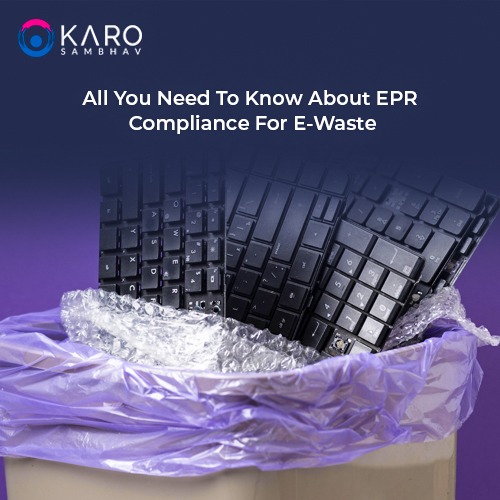How Extended Producer Responsibility is Changing the Face of Business
The buzz around Extended Producer Responsibility, or EPR,
is definitely evident. Will you not agree? However, aren’t you curious to find
out how the strategic policy approach is contributing to a paradigm shift in
the face of business? Let’s read about it.
The story about plastics, electronics, and waste cropping up as a primary
environmental concern is not unheard of. Industries dealing in consumer goods
such as electronics, food packaging, plastic items, and more leave a burgeoning
trail of waste behind. Now, with a multitude of organisations functioning
across the globe, the collective waste output is overwhelming and threatening.
If you are not aware already, even the tiniest bit of non-biodegradable plastic
takes 400 -500 years to decompose naturally. Besides, the chemicals in the
gigatonnes of trashed electronics affect the quality of the environment and
health on earth.
Since recycling isn’t enough to remove waste from the face of the earth,
environmentalists, in collaboration with governments and investors, have
formulated EPR
compliance rules.
But first, what is EPR?
EPR stands for Extended Producer Responsibility. It is strictly an environment
protection strategy that compels and obligates manufacturers, entrepreneurs,
producers, and recyclers to undertake the responsibility of a product’s
lifecycle from start to finish. Gone are the days when manufacturers could
truly create consumable products, sell the products, and shrug off thinking
about the heaps of waste piling up as end-of-life products or trash. As an
initiative to proceed with strategic waste management e-waste,
the policy ensures that all businesses and manufacturers are liable for the
waste that arises from the products they create.
The penalties for not adhering to the EPR compliance rules are quite serious.
Hence, businesses have now been coerced to rethink the creation, designing,
manufacturing, selling, reusing, and disposal of products that leave little to
no waste. In addition to holding businesses accountable for their waste
management practices, extended producer responsibility in India encourages
manufacturers to design products using nature-friendly and recyclable raw
resources that are also durable and serves longer in the consumption cycles. In
short, EPR drives circular economy that is a complete switch from the linear
take-make-waste model.
Why is EPR essential?
Before explaining more about EPR and how the policy envisions creating zero
waste management in India, let’s understand why recycling couldn’t stand the test
of the challenging times. Responsible recycling of products has always stood
out as an effective environmental practice. However, the expenses and lack of
infrastructure have done very less to subside the ratio of waste generated. EPR
is certainly a more strategic and obligatory approach. It makes it mandatory
for companies and businesses to rethink their production line, design ideas,
and, of course, the way they collect and treat the products that have reached
their end-of-life.
Since keeping up with the legal, financial, and physical details of EPR
compliance regulations is a challenging affair, companies are happy to entrust
the job to responsible PROs like Karo Sambhav or the listed waste management
companies in India. The organisations collect, treat, and repurpose the spent
products created by the manufacturer to stay clean and compliant with the EPR
norms. Little do you realise that the benefits of EPR are far more than just
environmental. With lesser stress on the mining of resources and more implementation
of responsible recycling,
businesses witness an economic boost.
In short, EPR compliance is the only way forward to a sustainable and
economically valuable future.



Comments
Post a Comment